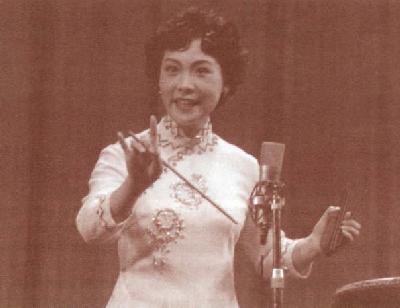Also called asMeihua Tune, Meihua Daguis a category ofDaguthat flourished in Beijing and Tianjin towards the end of the Qing Dynasty and the beginning of the Republic of China. It originated fromQingkou Dagu, becoming popular in northern Beijing at the end of the Qing Dynasty.
 |
| Ji Wei performing Meihua Dagu |
Meihua Daguunderwent reform and adaptation in the 1920s by Jin Wanchang, a Beiing
Daguartist, who made the
Meihua Dagusweet and lovely in melody. Lu Chengke, the famous Tianjin stringed instrument player, learned a number of popular tunes and enriched as well as improved the
Dagumelody and musical effect in accompaniment. He trained a number of girls to sing
Meihua Dagu, including Hua Sibao, Hua Wubao, and Hua Xiaobao (Shi Wenxiu). The reformation by Lu led to the development of a woman's voice in singing high pitch. This resulted in the soft and sweet style of the school of
Meihua Daguwith high pitch tunes for female voices. It became known as the Lu or Hua School and differs from the Jin Wanchang School, which is known for its delicate, minute, refined, elegant, bold, vigorous and beautiful rendition. The songs of
Meihua Daguare presented as short pieces, and use Beijing dialect in singing. The more famous works include
Thoughts of Husband Surging over the Mind of Wang Er jieand
Daiyu Buries Flowers.
After the 1960s,Meihua Daguagain went through a period of formation in vocal music. The routine opening words in the slow movement were dropped. This changed the style of using few words which drag on and on in singing. Fine music filled the air instead. The melody ofMeihua Dagubecomes more elegant and pleasing to the earTwo Springs Reflect the Moonperformed by the young artist, Ji Wei, leaves a deep impression on the audience. Ji Wei, born in 1956, sings with a beautiful, mellow and sweet voice and acts naturally with a poised manner. She is credited with having made many innovations to theMeihua Dagu. She studiedJingyun Daguat first. Later she changed her course and studiedMeihua Daguunder Shi Wenxiu and Hua Wubao.
